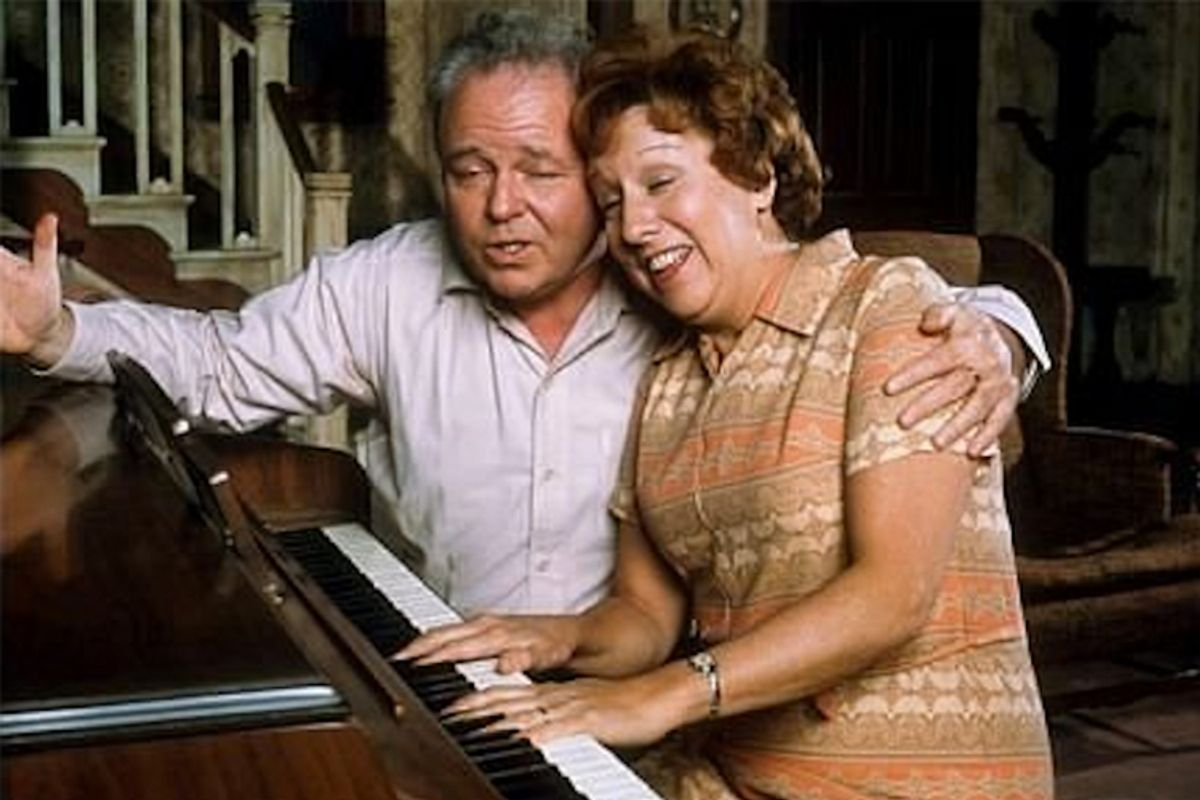
Introduction
When All in the Family first aired on January 12, 1971, it changed the face of television forever. In a landscape dominated by lighthearted family comedies, the show presented a bold and unapologetic look at the issues that were plaguing American society. For its time, the show was deeply controversial, breaking the mold of what was expected on TV and addressing topics like racism, sexism, homophobia, and political tension that many other shows avoided. At the heart of it all was Archie Bunker, a blue-collar, politically incorrect patriarch who would go on to become one of the most iconic figures in TV history.
A Groundbreaking Concept
Before All in the Family, most American sitcoms followed a formulaic pattern. They featured idealized families, usually white and middle-class, with perfect moral standards and little to no real-world problems. Shows like The Dick Van Dyke Show and Leave it to Beaver had set the tone for what audiences expected from family television. But All in the Family, created by Norman Lear, decided to break away from this tradition.
The show featured a family that wasn’t perfect, far from it. At the center was Archie Bunker, played by the incomparable Carroll O’Connor. Archie was a working-class man with outdated views on race, gender, and politics. His bigoted views and crude humor were often shocking, but the show used Archie’s character as a lens to explore the deep divides in American society.
What made All in the Family so revolutionary was its ability to tackle these sensitive topics without preaching or moralizing. Instead of avoiding controversial subjects, the show dove headfirst into them, forcing viewers to confront the issues they might have been uncomfortable discussing. Topics like racism, the Vietnam War, women’s liberation, and even the changing roles of the American family were dealt with directly, making the show unlike anything that had come before it.
The Complexity of Archie Bunker
Archie Bunker was not just a simple bigot. While he often espoused outdated and offensive beliefs, the show’s writing revealed the complexity behind his views. Archie was a product of his time, shaped by his upbringing, his economic struggles, and his experiences. But his ignorance and biases weren’t portrayed as inherent evil; rather, they were framed as part of a broader commentary on the societal forces that shaped him.
The brilliance of All in the Family was its ability to portray Archie’s character in a way that was simultaneously humorous, frustrating, and even sympathetic at times. As much as he resisted change, Archie was also portrayed as a loving, albeit flawed, father and husband. His relationship with Edith, his long-suffering wife, showed a more tender side of him, and moments where he would reveal vulnerability or confusion about the changing world made him relatable to the audience.
Carroll O’Connor’s portrayal of Archie was nothing short of groundbreaking. He took a character who could easily have been a one-dimensional stereotype and turned him into a complex, multifaceted person. O’Connor’s performance earned him several Emmy Awards and made Archie Bunker one of the most memorable characters in television history.
The Other Characters: Edith, Mike, and Gloria
While Archie Bunker was the central figure, All in the Family wouldn’t have been the same without its strong supporting cast. Edith Bunker, played by Jean Stapleton, was Archie’s wife and the epitome of warmth and kindness. She was often the voice of reason in their household, but she also had her moments of strength and independence. Edith’s character was essential in showing the contrast between Archie’s bigotry and the more compassionate, tolerant side of society.
Then there was Mike Stivic, Archie’s son-in-law, portrayed by Rob Reiner. Mike, a liberal college student, was everything Archie hated: progressive, outspoken, and deeply critical of the older generation’s views. The dynamic between Mike and Archie was a central theme of the show, with their constant ideological battles becoming a vehicle for the exploration of political and social issues. Gloria Bunker, played by Sally Struthers, was the bridge between the two, a loving daughter caught in the middle of her father’s and husband’s ideological warfare.
The relationship between these characters was both hilarious and heart-wrenching. Through their interactions, All in the Family presented a microcosm of the tensions that were present in American society at the time. The show’s ability to use humor to tackle such difficult subjects made it a groundbreaking achievement in television history.
The Legacy of All in the Family
In many ways, All in the Family was ahead of its time. The show laid the groundwork for future sitcoms that would tackle serious issues in a comedic format. Shows like Maude, The Jeffersons, and Good Times followed in the footsteps of All in the Family, taking on issues such as women’s rights, racism, and poverty. But even beyond the sitcom genre, All in the Family influenced the entire television industry. It demonstrated that audiences were ready for television that didn’t shy away from real-world issues.
Today, it’s hard to imagine a world without All in the Family and the impact it had on TV. The show’s legacy is still felt in modern television, from shows like The Simpsons to South Park, both of which continue to use humor to explore controversial issues. In many ways, All in the Family set the stage for the bold, socially conscious television we see today.
Conclusion
All in the Family was much more than just a sitcom. It was a cultural phenomenon that broke boundaries, challenged societal norms, and made television history. Through its controversial themes, complex characters, and brilliant performances, the show redefined what was possible in TV comedy. It remains one of the most influential television shows of all time, and its legacy continues to inspire and challenge audiences today.
